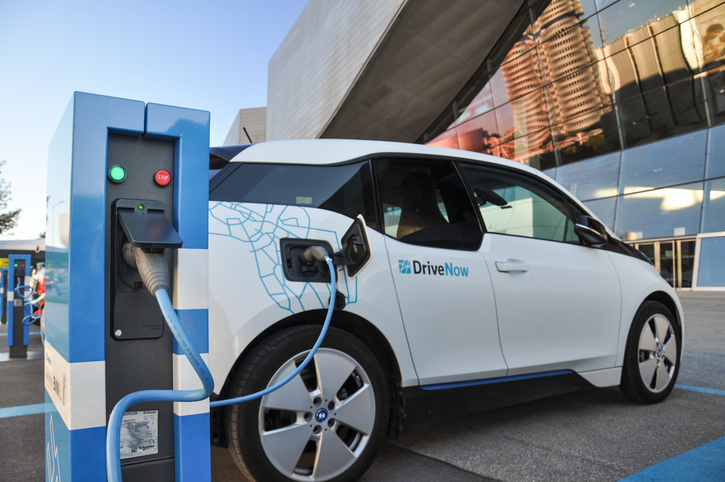On July 28, Tesla successfully delivered the first 30 Model 3 sedans to early buyers. Following the Roadster, Model S, and Model X, the Model 3 continues to push the boundaries of the electric vehicle (EV) industry. With a minimum range of 220 miles and a price ($35,000) at half of the Model S, Model 3 represents an opportunity for Tesla to grow its volume, something evinced by the number of low-cost pre-orders.
Follow Crunchbase News on Twitter & Facebook
On the heels of Tesla unveiling its new model, we wondered how has fundraising into EV startups changed over time? And what can we learn about the maturity of the companies that have picked up capital over the past decade and more?
Let’s find out.
EV Market In The U.S.
Tesla is not alone in building EVs. In fact, many startups and investors around the world have invested in the EV industry. Since each country has its own policies and regulations regarding conduct in the space, today we are focusing on the U.S. market for clarity and depth’s sake.
To see how well investment trends predict movements in the EV space, we charted the amount of money invested into U.S. EV startups across private funding rounds since 2004. The total amount of funding raised each year is separated by round types:

As you can see from above, 2009, 2011, and 2014 stood out as years during which U.S. electric car companies picked up record investment.
On the left half of the graph, from 2004 to 2009, the change in round types tells a story of growth in EV funding. First, we see the rise of early-stage rounds, which led to later-stage rounds such as Series D and beyond, as well as private equity rounds.
Starting from 2010, we see a general decline in the amount of money raised (2011 aside). Also, the diversity of rounds raised declined, implying that fewer companies of differing maturity were raising external capital. Two reasons could have contributed to this lack of activity in fundraising:
- Considering that quite a lot of capital was raised in 2009, EV companies may not have immediately needed additional funding the following period.
- Perhaps some of the companies that raised initial capital began to generate revenue, reducing their needs for external capital. That could fit into the overall context of EV boom starting in 2010, with GM announcing its Chevrolet Volt and Better Place deploying the first modern battery swapping model.
Also keep in mind that EV startups may source funding through means other than the typical VC rounds.
For example, starting from 2010, the year which it went public, Tesla received most of its financing from post-IPO debt and equity (approximately $4.4 billion). Typically, Post-IPO rounds are uncommon and a company would not resort to them unless it is in desperate need of capital.
A Closer Look at EV Startups (Besides Tesla)
The U.S. EV market is bigger than Tesla, of course, even though the company does attract a huge share of press attention (and capital) in its market category. To illustrate the point that there are other domestic players than Tesla, however, we picked three startups that made top six based on the total amount of money raised on our query list:
- Lucid Motors, based out of Menlo Park, California, was once hailed as an electric car startup that could rival Tesla. It was founded by an ex-Tesla VP and started out under the name Atieva in 2007. The company has raised $131 million to date, notably from investors outside the U.S., such as China Environmental Fund and Mitsui & Co.. Under financial shortages, Lucid Motors now faces the difficult choice between taking acquisition offers and raising money to build the factory for Lucid Air, its new model in development.
- One of the few non-Californian EV companies, Smith Electric Vehicles is headquartered in Kansas City, Missouri, and manufactures all-electric trucks and vans. The company had plans to go public in 2011, but it quickly withdrew the following year after receiving interests from private investors. Despite raising $67 million in two rounds, the startup was speculated in 2015 to be near the brink of bankruptcy. Earlier this year, one of its investor confirmed that Smith has stopped all operations due to lack of funding.
- The California-based Coda Automotive, originally Miles Electric Vehicles, raised $229 million from 2009 to 2011. It has not raised any new capital since then. Initially, Coda prided itself in collaborating with Chinese manufacturers. The company hoped to put out the most economical electric cars with their parts made in China, but designed and assembled in California. After several production delays, the company burned through the rest of its cash and filed for bankruptcy in 2013. Post-bankruptcy, Coda pivoted to battery energy storage to prepare for a damage-minimized sale.
A Lot of Losers. Not Too Many Winners.
If you have been excited by the number of EV startups in the U.S., it may be disappointing that the reality is less glamorous than the Tesla headlines have portrayed. EV startups, as we have seen, make bold claims about achieving record mile range and speed or becoming the next “big thing” in cleantech. Yet many have struggled to meet delivery deadlines, build assembly line production, and keep raising money to finance their vision. The firms that are able to escape bankruptcy or shutdown often have opt for internal shake-ups or acquisitions to stay alive.
Tesla is no exception. Tesla’s successful launch of Model 3 does not rule out the likelihood of it missing production targets again. It is also running on a deficit as of Q2 2017. Tesla went public in 2010 mainly to raise money and probably resorted to loans and external investments post-IPO for the same reason.
Car-making is difficult and costly, especially when it comes to electric vehicles. We probably won’t get another documentary like Chris Paine’s Who Killed the Electric Car? anytime soon, but we are still decades away from living in an oil-independent era.
Methodology
Our customized query defines EV as manufacturers of all-electric cars, trucks, and engines. Therefore, we did not include companies that produce hybrid cars, electric bikes, electric motorbikes, charging stations, batteries, and EV-related software. Even though Ford and GM are dabbling with EVs, we did not include them. It’s worth noting that some electric car startups are also developing autonomous driving technology.
iStockPhoto / wallix

Stay up to date with recent funding rounds, acquisitions, and more with the Crunchbase Daily.



![Illustration of a man sitting on a huge pile o' money. [Dom Guzman]](https://news.crunchbase.com/wp-content/uploads/Giant_Funding-470x352.jpg)





![Illustration of Harris and Trump: 2024 presidential election candidates. [Dom Guzman]](https://news.crunchbase.com/wp-content/uploads/Election-2024-300x168.jpg)

67.1K Followers